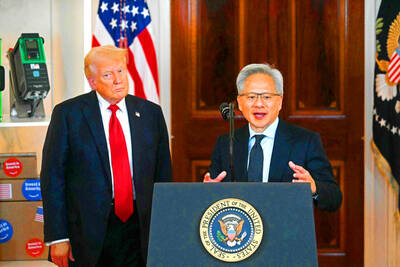Business sentiment improved noticeably across sectors last month as local firms gained better order visibility after major economies lifted pandemic-induced lockdowns and enabled a phased return to normalcy, the Taiwan Institute of Economic Research (TIER, 台經院) said yesterday.
The confidence gauge for local manufacturers came in at 85.73, an increase of 4.22 points from a month earlier, the monthly survey by the Taipei-based institute showed.
The survey showed that 38.1 percent of companies expect business to pick up in the next six months, a solid increase from 23 percent in April, while those with a dim view of prospects fell from 36.5 percent to 22 percent.
“The uplifting sentiment lent force to expectations that the nation’s economy is bottoming out and would start to recover from next quarter,” TIER research fellow Darson Chiu (邱達生) told a media briefing in Taipei.
As the US and Europe reopen their economies, local firms have reported better order visibility, Chiu said.
While the COVID-19 pandemic would no doubt weigh on sales of consumer electronics, companies are less pessimistic, but would likely remain cautious before the crisis settles, he said.
Last week, the Ministry of Economic Affairs reported that export orders, a critical gauge of actual exports one to three months ahead, for last month grew modestly for a second straight month, backed by demand for electronic components.
Suppliers of auto parts, bicycles and home appliances also expect business to gain traction in the coming six months, but makers of plastic and petrochemical products are not yet out of the woods, the survey showed.
The sentiment reading for service-oriented firms gained 6.87 points to 89.68, as Taiwanese regained confidence in domestic tours, shopping and dining as the outbreak is contained, Chiu said, adding that consumer activity might grow stronger in the coming months with new stimulus measures.
The government is to distribute Triple Stimulus Vouchers of NT$3,000 per person from July 15 to shore up domestic demand.
The confidence measure for the civil engineering and building sectors added 9.99 points to 94.26, ending four months of decline, the survey showed.
Prospective buyers are expected to start searching for homes after staying on the sidelines during the outbreak, the institute said.

Taiwan Semiconductor Manufacturing Co (TSMC, 台積電) last week recorded an increase in the number of shareholders to the highest in almost eight months, despite its share price falling 3.38 percent from the previous week, Taiwan Stock Exchange data released on Saturday showed. As of Friday, TSMC had 1.88 million shareholders, the most since the week of April 25 and an increase of 31,870 from the previous week, the data showed. The number of shareholders jumped despite a drop of NT$50 (US$1.59), or 3.38 percent, in TSMC’s share price from a week earlier to NT$1,430, as investors took profits from their earlier gains

AI TALENT: No financial details were released about the deal, in which top Groq executives, including its CEO, would join Nvidia to help advance the technology Nvidia Corp has agreed to a licensing deal with artificial intelligence (AI) start-up Groq, furthering its investments in companies connected to the AI boom and gaining the right to add a new type of technology to its products. The world’s largest publicly traded company has paid for the right to use Groq’s technology and is to integrate its chip design into future products. Some of the start-up’s executives are leaving to join Nvidia to help with that effort, the companies said. Groq would continue as an independent company with a new chief executive, it said on Wednesday in a post on its Web

CHINA RIVAL: The chips are positioned to compete with Nvidia’s Hopper and Blackwell products and would enable clusters connecting more than 100,000 chips Moore Threads Technology Co (摩爾線程) introduced a new generation of chips aimed at reducing artificial intelligence (AI) developers’ dependence on Nvidia Corp’s hardware, just weeks after pulling off one of the most successful Chinese initial public offerings (IPOs) in years. “These products will significantly enhance world-class computing speed and capabilities that all developers aspire to,” Moore Threads CEO Zhang Jianzhong (張建中), a former Nvidia executive, said on Saturday at a company event in Beijing. “We hope they can meet the needs of more developers in China so that you no longer need to wait for advanced foreign products.” Chinese chipmakers are in

POLICY REVERSAL: The decision to allow sales of Nvidia’s H200 chips to China came after years of tightening controls and has drawn objections among some Republicans US House Republicans are calling for arms-sale-style congressional oversight of artificial intelligence (AI) chip exports as US President Donald Trump’s administration moves to approve licenses for Nvidia Corp to ship its H200 processor to China. US Representative Brian Mast, the Republican chairman of the US House Committee on Foreign Affairs, which oversees export controls, on Friday introduced a bill dubbed the AI Overwatch Act that would require the US Congress to be notified of AI chips sales to adversaries. Any processors equal to or higher in capabilities than Nvidia’s H20 would be subject to oversight, the draft bill says. Lawmakers would have